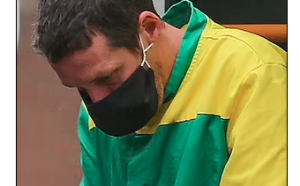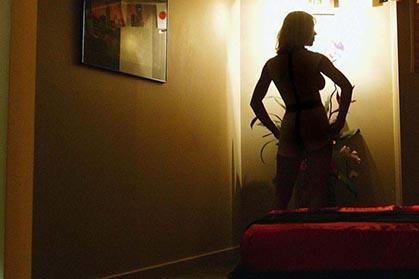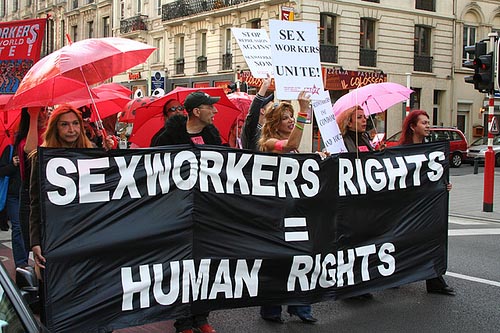SCOT-PEP, a Scottish charity which campaigns for the rights of sex workers, today exposed proposals from Police Scotland to impose unannounced ‘welfare visits’ on sex workers who work from home.
SCOT-PEP will today seek an urgent meeting with SNP Ministers to request that the scheme be scrapped. Under “Operation Lingle” the police plan to pilot intimidating visits of this sort in Glasgow ahead of a planned rollout across Scotland.
The operation includes a programme of increased online surveillance of suspected sex workers, a clear violation of the civil liberties both of sex workers and the general public. Members of the public will also be asked to speculate about which of their neighbours might be a sex worker and report them to the police, despite the fact that selling sex remains legal in Scotland. In SCOT-PEP’s view “Operation Lingle” would undermine harm reduction strategies and destroy any remaining sex worker trust in the police. SCOT-PEP’s opposition to this scheme is shared by leading charity HIV Scotland, who described these raids as ‘concerning’ and called on Police Scotland to reconsider.
In private conversations with the police, “Operation Lingle” has been presented to SCOT-PEP as a progressive and ‘welfare’-based policy. However, sex workers’ serious concerns were ignored, suggesting the welfare of sex workers was given no more than token consideration.
Where sex workers are working alone, they will be intimidated. Where two or more sex workers are working together for safety – a set-up that is currently criminalised – they will fear police interest indicates arrest is imminent, and those sex workers will be forced to choose between a safer workplace, and prosecution. Police Scotland’s strapline is ‘keeping people safe’: it should be unacceptable to pursue policies that make people more vulnerable and afraid.
Written questions have been lodged today at Holyrood asking whether Ministers signed off Police Scotland’s bizarre and intimidating new tactics, and polling data also published today shows the Scottish public overwhelmingly rejects punitive approaches to sex work.
Two questions on the issue of sex work were asked on SCOT-PEP’s behalf by the pollsters Survation (3). The first shows a clear rejection of the “Swedish model”, whereby clients of sex workers are criminalised: the poll indicates the Scottish public oppose this proposal, recently defeated at Holyrood, by 68.5% to 31.5%. The second question asks whether it should be made legal for two or more sex workers to work independently from the same premises: 86.8% of those expressing a view backed this change, and just 13.2% opposed it. SCOT-PEP believes the evidence is clear that changing the law in this way would greatly reduce the risks of violence experienced by sex workers.
In response to Police Scotland’s proposals, SCOT-PEP will today request an urgent meeting with Kenny MacAskill, Cabinet Secretary for Justice, both to discuss the scrapping of “Operation Lingle” and to propose new legislation to protect sex workers, as supported by the Scottish public in Survation’s poll.
The results of this poll highlight how badly out of step Police Scotland are with the Scottish public when they seek to make life more difficult for sex workers: the overwhelming preference of the public is for safety, human rights, and harm reduction: sex workers need safe workplaces, not criminalisation. Police Scotland are also out of touch with opinion at Holyrood, where an attempt to bring in the failed ‘Swedish model’ was rejected last year. This approach would have continued to criminalise two sex workers working together for safety, and reduced their ability to screen clients. This kind of indirect criminalisation, which clearly increases risks for sex workers, is one of the reasons the Swedish model has been criticised by organisations such as UNAIDS and Human Rights Watch – as well as by sex workers themselves.
SCOT-PEP therefore calls on Police Scotland to listen to the voices of sex workers – and common sense – and scrap “Operation Lingle”. Sex workers need full decriminalisation, including of workplaces, colleagues, and managers, to ensure that sex workers and the police are no longer in an adversarial relationship and can work together to tackle violence and uphold sex workers’ human and labour rights.
One sex worker, Amy, said:
“The idea that I could open the door to an unexpected visit from the police is really frightening. This is about making us feel hunted, like criminals, even when we’re not breaking any laws. If they ‘out’ me to my neighbours, I could get evicted or harassed. How is causing me to risk homelessness a ‘welfare visit’?
“The idea of asking the public to point fingers at potential sex workers is profoundly stigmatising and alarming, as if the police are encouraging members of the public to help hunt us down. It raises questions about what the police think a sex worker looks like: a single woman, perhaps? This hurts all women by suggesting that Police Scotland are actually the morality police, about to turn up on your doorstep for having ‘too many’ boyfriends or whatever.”
Another sex worker, Cat, said:
“I work with a friend because it’s so much safer. If a client were to turn nasty, I’d know I have her in the other room to help. Unbelievably though, working together means we could both get arrested. What do the police think we’ll think if they turn up at our door? Obviously we’re both scared that these “visits” mean we can no longer work together – if the police are digging up intelligence on two women working together, we’re so much more at risk of arrest. A conviction for prostitution-related offences won’t help me “exit” to another job – who’ll want to employ me? This operation makes me think I should start working alone, which is so so scary. There’s so many assaults on women in Glasgow, and instead of going after those perpetrators, the police want to go after a couple of women?”
Another sex worker, Elena, said:
“These welfare visits scare me no end. How am I supposed to explain police knocking on my door to my neighbours? What if they come when my husband is in? I can’t imagine what it’s like for women with children! There is nothing welfare about these intrusions! They will ruin families. Not to mention, I struggle to understand how police justify snooping on people who aren’t doing anything illegal. Why not come with welfare visits to barbers, students or accountants?”
Chief Executive Officer for HIV Scotland, George Valiotis, speaking for HIV Scotland, said:
“Criminalisation that forces sex workers to work alone has been shown by organisations like the World Health Organisation and UNAIDS to make sex workers more vulnerable to violence, and less able to insist on condom use. We call on Ministers and the police to reconsider such policies.”
A board member of SCOT-PEP said:
“Many people believe the merger of Scotland’s separate police forces has led to Strathclyde Police’s repressive policies on sex work being exported elsewhere across Scotland, as with the raids on Edinburgh’s saunas which began last year, and this operation seems to confirm that Police Scotland are effectively just Strathclyde Police writ large. Perhaps senior officers have failed to notice, but efforts last year to introduce more repressive laws against sex workers came to nothing at Holyrood. The Scottish Parliament rejected the failed “Swedish model”, whereby clients are criminalised despite the increased risk of violence against sex workers this approach brings. If Police Scotland continue with this operation, they will have demonstrated that they are out of touch with the Scottish public and out of touch with the Scottish Parliament. No other members of the public are ever exposed to surprise police visits simply because of the nature of the lawful work they do. This scheme singles out sex workers for persecution and intimidation, as does the Stasi-like plan that other members of the public should be encouraged to make unfounded accusations against their neighbors.
“What’s not clear, however, is whether Scottish Ministers have approved this draconian shift in policy or whether Police Scotland are acting on their own initiative here. We are therefore grateful to Patrick Harvie MSP for lodging a series of Parliamentary Questions today to establish the basis for this potentially highly damaging new approach, which we believe could seriously undermine community relations and drive sex workers further underground. We will today also request an urgent meeting with Kenny MacAskill, the Cabinet Secretary for Justice, and we will be asking him to put this operation on hold until it can be given proper public scrutiny, and ideally either scrapped altogether or replaced by a policy which puts the safety of sex workers ahead of some counterproductive sense of moral panic. The evidence is clear: the public want to see the laws changed to protect sex workers, not the imposition of this sort of punitive “raids in disguise”, an idea which appears to have been phoned in from the 1950s.”
Patrick Harvie, Green MSP for Glasgow, said:
“If home visits are supposed to be about welfare, they should be delivered by an agency with a clear harm reduction ethos, not by the police after soliciting “tip offs” from people’s neighbours. Scotland has a very poor track record of harm reduction in this area, and I would urge the Scottish Government and Police Scotland to reconsider this operation urgently. Our priority should be protecting sex workers against violence and exploitation, not intimidating them and using police intelligence to identify and harass them.”
One sex worker, Vee, said:
“Even if they aren’t doing arrests today, that information that they’re gathering will stay on their files, and if their approach gets more openly punitive, we’ll be targeted. It’s absurd to paint this as ‘in our best interests’. Police harassment – or arrest – aren’t in the best interests of any sex worker, regardless of why they’re working.
“How can they justify stalking me across the internet, and trying to hunt down private information like my home address? If someone else was doing that, I’d want to call the police! This makes me feel like I just can’t trust them.”
Neil McCulloch, a volunteer at SCOT-PEP, said:
“As someone with a background working in both refugee and LBGTQ rights, the attempt to make the public tip the police off about supposed sex workers as part of “Operation Lingle” is profoundly concerning. There are plenty of people who are not sex workers, but who, for various reasons, might fear being ‘read’ as sex workers by the general public – the general public who the police are encouraging to call in with ‘tips’.
“For example, migrants, LGBTQ people, or people who are both migrant and LGBTQ might very reasonably fear being stereotyped as sex workers, and receiving unasked for – and unsettling – police attention as a result. The police urgently need to consider not only their relations with sex workers, but also their relations with migrant and LGBTQ communities – what limited trust there is could be destroyed by this.”
Source






